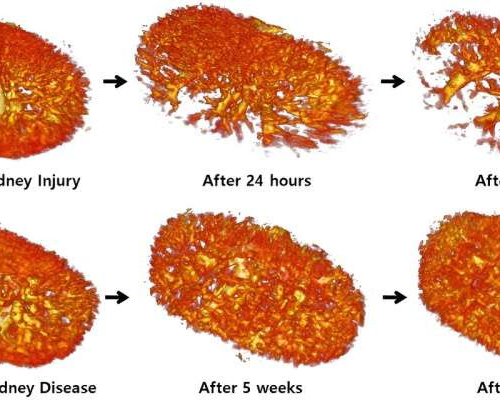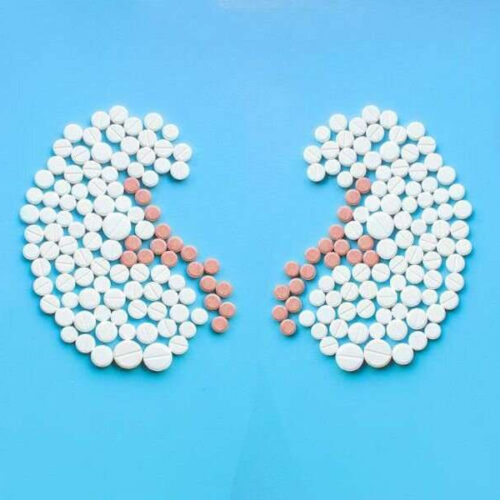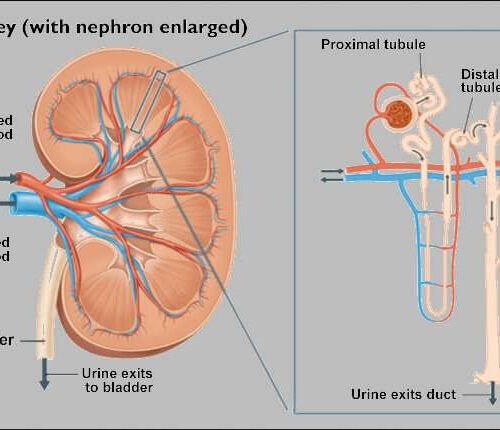by Adam Taylor, The Conversation Credit: Unsplash/CC0 Public Domain Thanks to millions of years of evolution, the human body has become well versed in its developmental processes. Most of the time, it gives us the correct number of organs and structures that we need to function. But sometimes, hiccups in this process mean people end...
Tag: <span>kidneys</span>
Ultrafast ultrasound: First successful contrast agent-free imaging of complex structure of kidneys
by Pohang University of Science and Technology Vascular changes in acute and diabetic renal failure. Credit: POSTECHA research team at POSTECH (Pohang University of Science and Technology) has investigated kidney diseases using ultrafast ultrasound that captures 1,000 images in just one second. The research team has achieved imaging of the three-dimensional microvasculature of the kidneys using...
Common Diabetes Pills Also Protect Kidneys
Medication people with type 2 diabetes use to manage their blood sugar also appear to protect their hearts and kidneys, according to a new study in JAMA Network Open. These pills, known as sodium-glucose cotransport protein 2 (SGLT2) inhibitors, reduce the amount of blood sugar in a kidney by causing more glucose to be excreted...
Study identifies biomarker for allergic reaction in kidneys
by Johns Hopkins University In a study led by Johns Hopkins Medicine, in collaboration with Yale School of Medicine, researchers have identified a biomarker found via a simple urine test that can be used to diagnose acute tubulointerstitial nephritis (AIN), a medical condition that causes inflammation of the kidneys and can lead to acute kidney injury (AKI)—a sudden...
Real-world data links rosuvastatin to adverse effects on kidneys
Rosuvastatin is associated with increased risks for hematuria, proteinuria, and kidney failure with replacement therapy (KFRT) compared with atorvastatin use, according to a study published online July 19 in the Journal of the American Society of Nephrology. Jung-Im Shin, M.D., from the Johns Hopkins Bloomberg School of Public Health in Baltimore, and colleagues used deidentified electronic...
SARS-CoV-2 can infect kidneys directly, researchers find
by University of Washington School of Medicine COVID-19 was found to directly invade proximal tubule cells in kidney organoids. Credit: National Institute of Diabetes and Digestive and Kidney Diseases Up to 25 percent of patients’ COVID-19 cases involve acute kidney injury—the kidneys’ equivalent of a heart attack. Clinicians have suspected that such injuries are a...
Stroke treatment may backfire when kidneys don’t work well
NATIONAL CEREBRAL AND CARDIOVASCULAR CENTER Researchers at the National Cerebral and Cardiovascular Center in Japan show that excessive blood pressure reduction for acute intracerebral hemorrhage is risky in people with decreased kidney function Suita, Japan — Stroke and chronic kidney disease are both difficult to handle in their own rights, but having a stroke when...
COVID-19 as systemic disease: What does that mean for kidneys?
ERA-EDTA It was clear at a relatively early stage of the pandemic that SARS-CoV-2 causes a wide range of symptoms; in addition to typical respiratory symptoms, patients also had neurological symptoms (starting with anosmia), gastrointestinal symptoms, elevated liver values, and renal, urinary, or hematological changes, for example. The fact that such findings occurred not only...
Risk of diabetes complications increases with elevated levels of NT-proBNP
DEUTSCHES ZENTRUM FUER DIABETESFORSCHUNG DZD Healthy people – especially women – with elevated levels of the heart failure marker NT-proBNP have a lower risk of developing type 2 diabetes. However, if these people develop diabetes nonetheless, they are more likely to suffer from macro- and microvascular complications such as heart attack, stroke, or severe damage...
Missing sodium-channel component may protect against diet-induced artery stiffening
by American Physiological Society New research in mice finds that deficiency in one small component of a signaling pathway may protect against artery stiffening and subsequent kidney disease associated with a high-fat, high-sugar diet. The study is published in the American Journal of Physiology-Renal Physiology. Consuming a western diet—typically high in fat and refined carbohydrates,...
- 1
- 2



